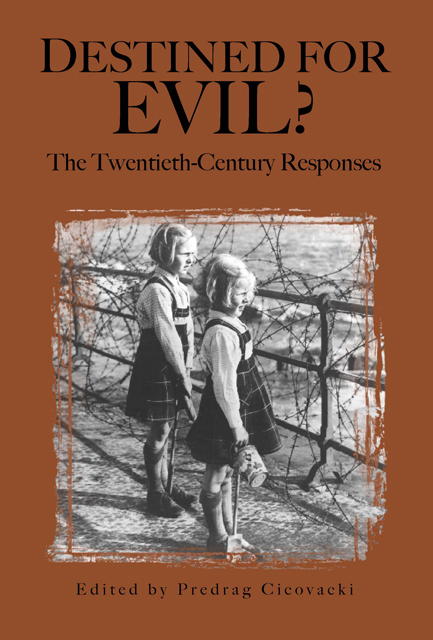Book contents
10 - From Relative to Absolute Evil
Published online by Cambridge University Press: 17 March 2023
Summary
The possibility and even likelihood of the self-destruction of humanity constitutes now its most specific and basic characteristic. Since 1945 the apocalyptic possibility and likelihood have highly increased. I am not referring solely to a catastrophe caused by a nuclear war but also to one caused by chemical, biological, cybernetic, radiological and other (we do not know which ones will arise in future) apocalyptic means. I am also having in mind apocalyptic terrorists, apocalyptic suicides and apocalyptic lunatics and not only apocalyptic war conflagrations between states. I believe that terrorist fanaticism is a greater apocalyptic danger than a “clash of civilizations.” To this list of possible apocalyptic accidents should also be added one more: human beings have never been capable of creating perfect technological means.
Humanity is playing an apocalyptic roulette. This danger is irreversible. Humanity finds itself in a race with apocalyptic time. The metaphor I have been using is the ship “Humanic” (I have coined this word from “Titanic”) on which humanity is sailing. At the same time humankind is showing a monumental “ability” to delude itself and (more or less) passively await its “fate,” an “ability” that is inherent in its auto-apocalyptic disposition. However, the objective state of humanity is such that its entire existence must be divided into the period before and the period after its “empowerment” to self-destruct.
If I am right, it follows that auto-apocalypse must be separated from the categorical and epochal dichotomy between modernity and post-modernity, as well as between modernism and post-modernism, and given an absolute priority, both theoretical and practical. I call this break “post-postmodernity” and reflection upon it “post-postmodernism.”
Here are my reasons for the deconstruction of the post-modernist deconstruction of modernism. The threat of the self-destruction of humanity cannot be adequately treated by post-modernist: de-totalization, radical de-construction, de-subjectization of humans, fragmentation, differentiation, heterogeneity, de-foundation, individual and group perspectivism, small and local narratives, relativization of all truths, including scientific ones, and all values, even those most humanistic ones. Rather, in order to survive we need exactly the opposite ideas: theoretical and practical re-totalization, radical re-construction, re-subjectization of humans, globalization, equalization, homogeneity, re-foundation, a universal human perspective, a great and central narrative, absolutization of the truth of the threatening auto-apocalypse and absolutization of the value of the survival of human species.
- Type
- Chapter
- Information
- Destined for Evil?The Twentieth-Century Responses, pp. 147 - 154Publisher: Boydell & BrewerPrint publication year: 2005

